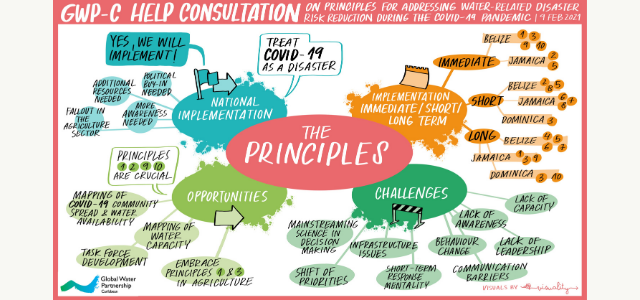These Principles, present urgent practical advice for leaders and managers with expertise in responding to DRR or COVID-19 challenges, to be better prepared for the “twin risks.” This being, the vulnerability of countries in the pandemic to both health and water-related disasters at the same time. Risks which are of major concern for many Caribbean countries.
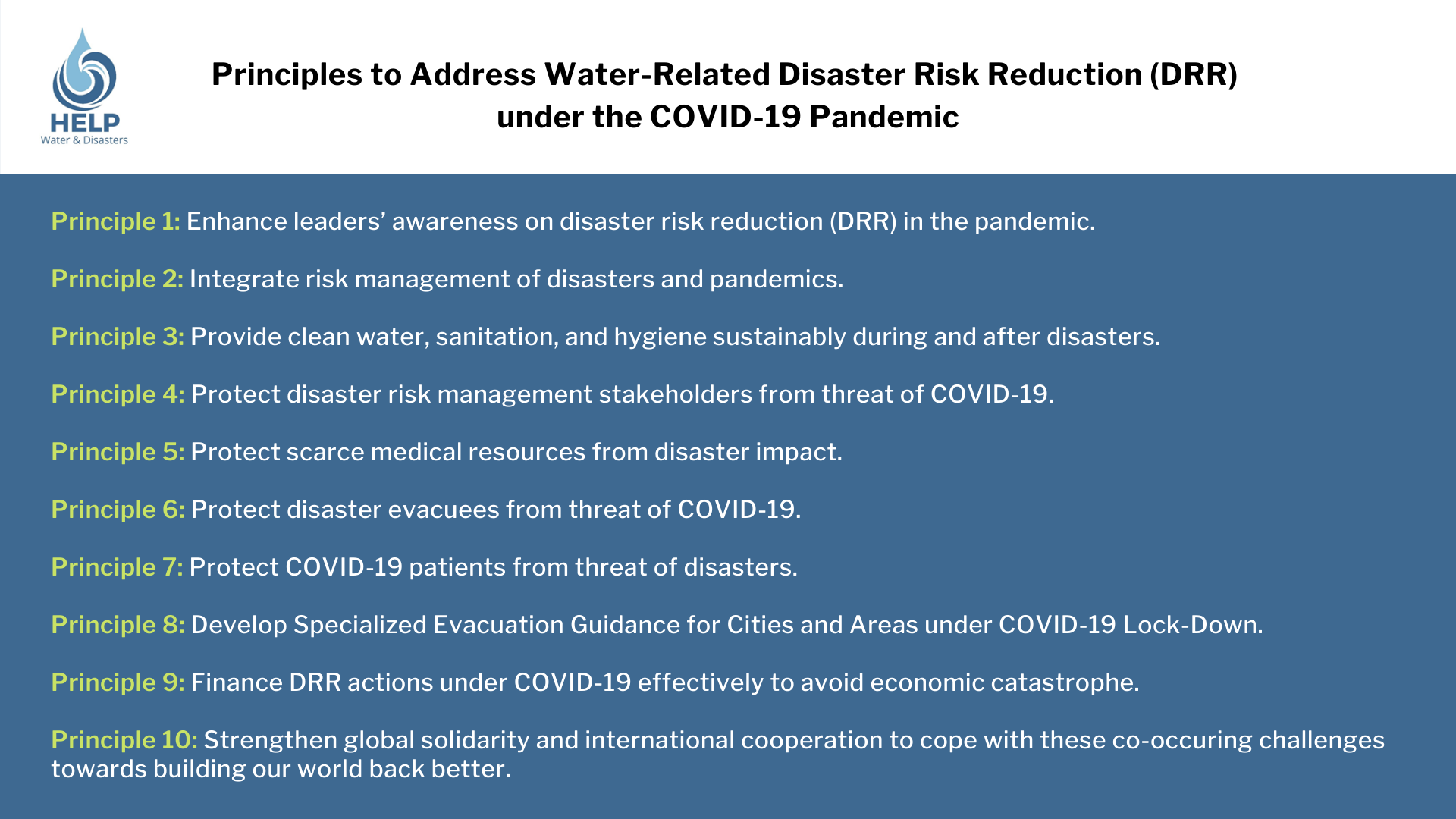
Given the importance of addressing this issue, Global Water Partnership-Caribbean (GWP-C) and Global Water Partnership (GWP), partnered with HELP (with support from the Government of Japan and the National Graduate Institute for Policy Studies) to conduct a 3-hour virtual Consultation on February 9th, 2021 for the Caribbean. The purpose of the event being to discuss, share and gain practical insights on how the HELP Principles could be implemented in the field. Additionally, to equip decision-makers, experts and practitioners in the Caribbean region, on how to be better prepared for co-occurring disasters on water and health. Watch the 3-minutes recap video of the Consultation below.
His Excellency Dr. Mohamed Irfaan Ali: President of the Co-operative Republic of Guyana and Commander-in-Chief of the Armed Forces was the keynote speaker at the Consultation. In his address to the ninety (90) plus attendees, he commended GWP-C for this timely and relevant event and congratulated HELP for leading the effort on water-related disaster risk reduction (DRR) during these challenging times.
In his speech, the President of Guyana, His Excellency Dr. Ali said “The risks from the pandemic combined with the threats posed by natural disasters, particularly the threat of water-related disasters, have led to the coining of the term “twin risks.” This is an important part of our development moving forward, access to resources, negotiation for new resources, especially for developing countries is becoming very challenging, as much of international resources have been diverted to the pandemic, which will definitely impact our medium and long-term plans, climate adaptation policies and building risk reduction capacity for natural disasters.”
He stated that “The Principles to address water-related disaster risk reduction, under the COVID-19 pandemic developed by HELP, is a timely and relevant complement to the Sendai Framework for Disaster Risk Reduction.” According to him “These Principles have the potential to help governments and stakeholders to be better prepared to manage water-related disasters during and after the pandemic. It is therefore an indispensable tool for those involved and entrusted in water-related disaster risk reduction. The Principles are tailored to address water-related disasters but are equally applicable to other types of disasters. They remind us, that unless such disasters are properly managed it can lead to an escalation of the pandemic.” Watch the keynote address by His Excellency Dr. Ali.
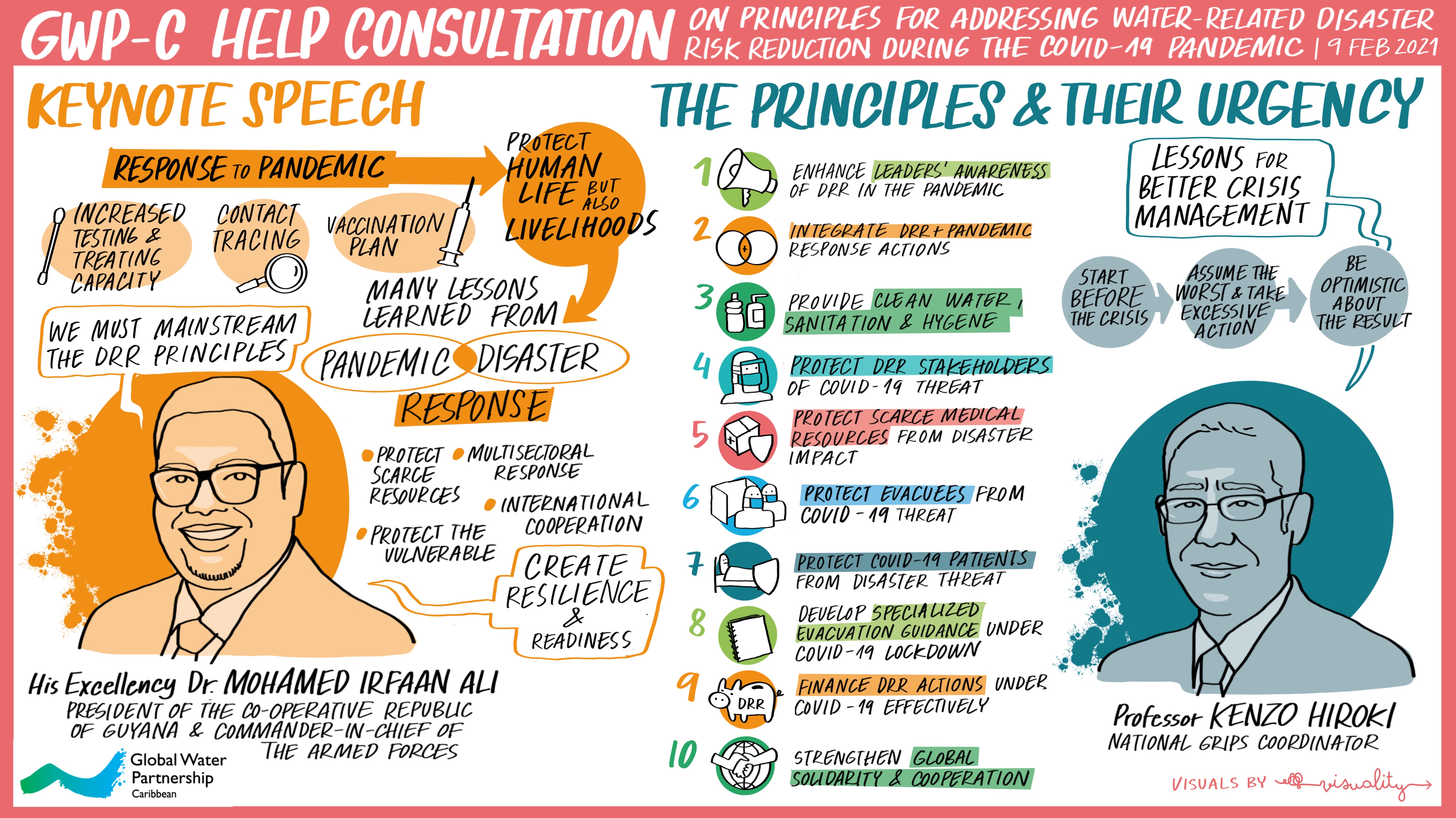
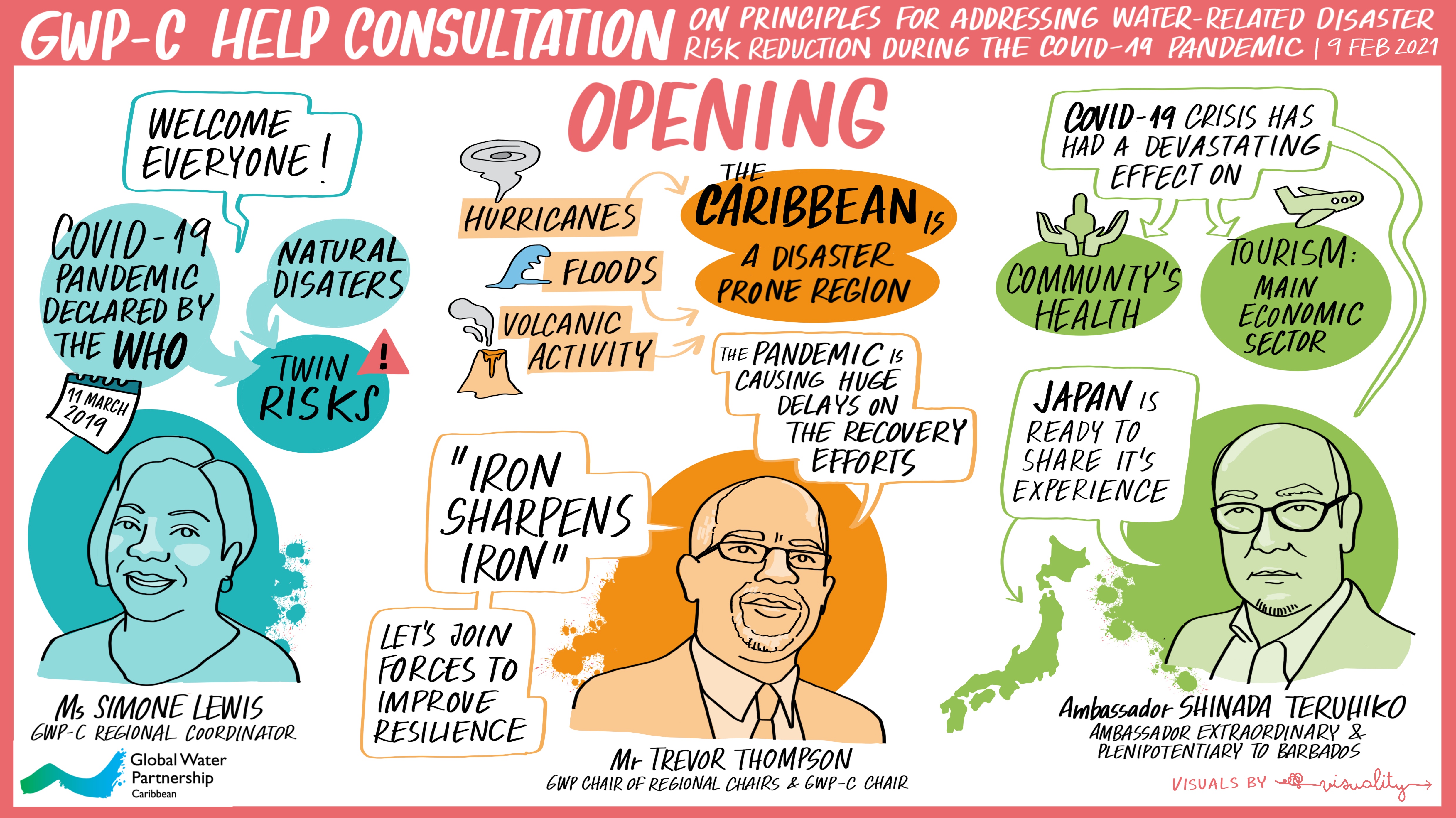
In addition to President Ali, other speakers at the opening ceremony included:
Ms. Simone Lewis, GWP-C Regional Coordinator who shared that “It is difficult to argue that countries were prepared to face the challenges brought on by COVID-19. However, those with inadequate public health systems, poor emergency response systems and weak water governance, were and still are impacted the most by the pandemic. These risks are further amplified by natural disasters which could strike even in the middle of a pandemic.” In light of this, she pointed out why it was therefore very important for GWP-C in partnership with HELP to put on this Consultation for the benefit of the Caribbean region.
Mr. Trevor Thompson, GWP Chair of Regional Chairs and GWP-C Chair, in his remarks shared examples of major climate and water-related disasters in the Caribbean region, one in particular being the extremely powerful and devasting Hurricane Dorian that hit The Bahamas back in September 2019. He pointed out that “one of the major differences with The Bahamas experience, was that just a few months later, The Bahamas along with the rest of the world, was in the middle of a global pandemic.” He further pointed out that this is no doubt, having a negative effect on the recovery efforts in The Bahamas, as resources that should have been going towards rehabilitating homes and the water supply, now have to go into protecting and saving lives in the pandemic.
Ambassador SHINADA Teruhiko, Ambassador Extraordinary and Plenipotentiary to Barbados also spoke at the opening ceremony, expressing his appreciation for the convening of such timely and important discussions.
Professor Kenzo Hiroki, Coordinator of HELP and Professor at the National Graduate Institute for Policy Studies (GRIPS) delivered a valuable presentation at the Consultation’s opening on “The Principles and its Urgency.” In it, he provided various examples of natural disasters in Asia and shared vital lessons for better crisis management as it relates to disasters.
The Consultation was very interactive, enabling participants to provide feedback on various polling questions related to the HELP Principles and its use specific to their respective countries. There was also a key session titled “Experiences from Different Perspectives” where the following representatives gave short presentations, which later culminated in a Questions and Answers segment:
Dr. Miho Ohara, Senior Researcher at the International Centre for Water Hazard and Risk Management (ICHARM) | Presentation Theme: Japanese Disasters and DRR actions under COVID-19
Dr. Lisa Indar, Director, Surveillance, Disease Prevention and Control at the Caribbean Public Health Agency (CARPHA) | Presentation Theme: Water-related DRR and public health during COVID-19
Dr. Paulette Bynoe, Lecturer in the Faculty of Earth and Environmental Sciences, University of Guyana | Presentation Theme: Water-related DRR during COVID-19
Mrs. Tasheka Haynes-Bobb, National Coordinator, GEF Small Grants Programme (SGP), St. Vincent & the Grenadines | Presentation Theme: Community-based experiences in coping with water-related disasters and the COVID–19 pandemic
Ms. Kerricia Hobson, National Coordinator, Caribbean Youth Environment Network (CYEN)-Grenada | Presentation Theme: Youth, gender and marginalised groups’ strategies for addressing water-related disasters and COVID-19
Dr. Donneil Cain, Project Development Specialist at the Caribbean Community Climate Change Centre (CCCCC) | Presentation Theme: Business continuity and challenges faced during water-related disasters and the COVID–19 pandemic
The visual below provides a summary of the key information coming out of the “Experiences from Different Perspectives” session:
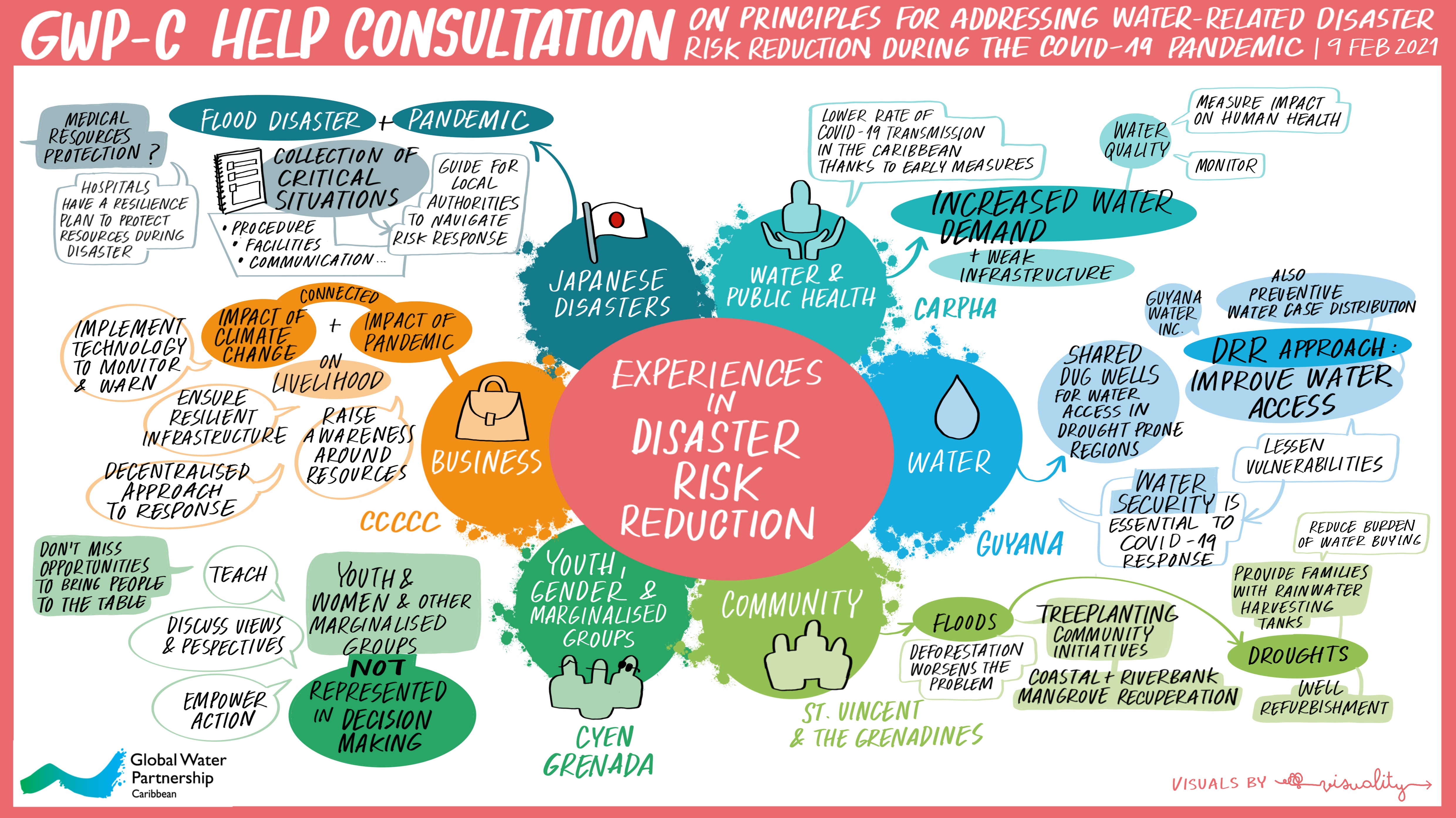
Key to the Consultation was an interactive session in which participants were placed into four (4) break-out groups to each share and discuss one of the following questions:
- Do you think it will be applicable to implement the Principles in your country? Explain.
- Which Principles do you think can be implemented in your country in the immediate (under 1 year), short (1 – 3 years) and long-term (3 – 5 years) period?
- What are the major challenges you foresee, as it relates to the implementation of the Principles?
- State the opportunities that exist for general implementation of the Principles?
This session provided a wealth of information and key insights from participants on the practical implementation of the HELP Principles to Address Water-Related DRR during the COVID-19 Pandemic. The outputs from this session are summarised in the visual below.
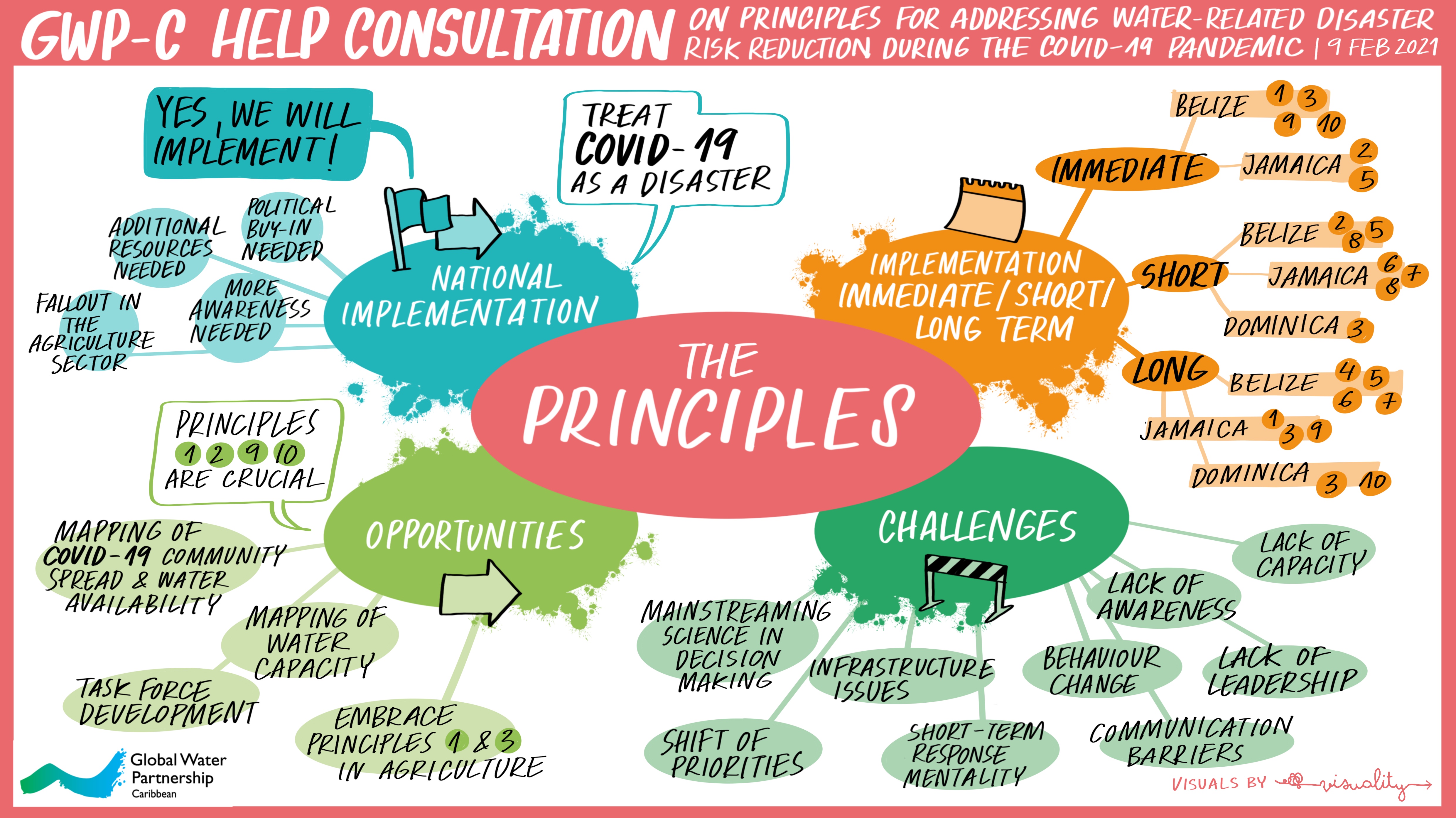
The GWP-C and HELP Consultation concluded with Professor Kenzo Hiroki sharing next steps with participants. He expressed a wiliness to review suggested areas, with a view to strengthening the Principles. He showed great appreciation for the comments and inputs from participants, as they reflect the Caribbean experiences of different practitioners in their specific fields. The feedback from the Consultation, will be shared with HELP, which will assist them in enhancing the Principles. Professor Hiroki explained that similar Consultations are taking place in Asia and other regions.
He indicated that a comparison of all consultations will be undertaken, with the intention of strengthening the Principles. These will be ultimately presented to the highest discussion point at the fifth UN Special Thematic Session on Water and Disasters, to be held in June or July 2021. Participants will all be invited to observe the feedback of their inputs at that Session.
